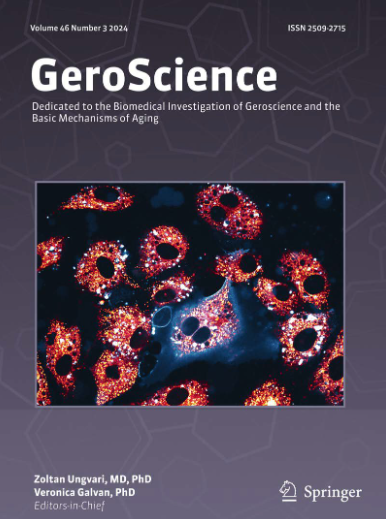中年城市成年人的创伤后应激障碍、抑郁症状和认知功能:跨生命周期多样性社区的健康老龄化研究
IF 5.4
2区 医学
Q1 GERIATRICS & GERONTOLOGY
引用次数: 0
摘要
创伤后应激障碍(PTSD)和抑郁症状与认知功能有关。然而,创伤后应激障碍和抑郁症对认知功能的影响,特别是在中年城市成年人中,尚不清楚。横断面数据分析了来自1434名参与者的数据,这些参与者来自“生活多样性社区的健康老龄化”研究。我们使用多变量调整线性回归和结构方程模型(SM)来检验PTSD、CES-D和认知测试成绩之间的关系。我们发现创伤后应激障碍与抑郁症状密切相关,尽管对潜在的混杂因素进行了调整。SM与认知测试成绩作为最终结果发现延迟自由回忆和列表立即召回反向与创伤后应激障碍得分,te的β±SE - 0.08398±0.02654,P = 0.002,和β±SE - 0.10734±0.02571,P < 0.001,分别和前辈们β±SE - 0.06786±0.02202,P = 0.002,和β±SE - 0.07625±0.02140,P < 0.001,表明抑郁症状明显介导与贫穷的口头记忆创伤后应激障碍的潜在关联。其他认知测试成绩显示显著的总或直接影响(p < 0.05),提示不同的途径不包括抑郁症状作为中介。在较高的内膜-中膜厚度(IMT)中,PTSD评分与总CES-D评分密切相关。本研究为中年城市成年人PTSD与认知功能之间的关联提供了证据,部分通过言语记忆中的抑郁症状介导,而IMT增强了PTSD与抑郁症状之间的关联。本文章由计算机程序翻译,如有差异,请以英文原文为准。
Post-traumatic stress disorder, depressive symptoms, and cognitive function among middle-aged urban adults: Healthy Aging in Neighborhoods of Diversity across the Life Span study.
Post-traumatic stress disorder (PTSD) and depressive symptoms Have been linked to cognitive functioning. However, the impact of PTSD and depression on cognitive functioning, especially among middle-aged urban adults, is not well understood. Cross-sectional data were analyzed from 1434 participants from the Healthy Aging in Neighborhoods of Diversity across the Life Span study. We used multivariable adjusted linear regression and structural equation models (SM) to test the association between PTSD, CES-D, and cognitive test scores. We found PTSD to be strongly associated with depressive symptoms despite adjustment for potential confounders. SM with cognitive test scores as final outcomes found Delayed Free Recall and List A immediate recall inversely associated with PTSD score, with TEs of β ± SE - 0.08398 ± 0.02654, P = 0.002, and β ± SE - 0.10734 ± 0.02571, P < 0.001, respectively, and IEs of β ± SE - 0.06786 ± 0.02202, P = 0.002, and β ± SE - 0.07625 ± 0.02140, P < 0.001, indicating that depressive symptoms significantly mediated the potential association of PTSD with poorer verbal memory. Other cognitive test scores showed significant total or direct effects (p < 0.05), suggesting different pathways not including depressive symptoms as a mediator. At higher intima-media thickness (IMT) tertiles, PTSD score was strongly associated with total CES-D score. This study provides evidence of an association between PTSD and cognitive functioning among middle-aged urban adults, partially mediated through depressive symptoms in verbal memory, with IMT enhancing the association between PTSD and depressive symptoms.
求助全文
通过发布文献求助,成功后即可免费获取论文全文。
去求助
来源期刊

GeroScience
Medicine-Complementary and Alternative Medicine
CiteScore
10.50
自引率
5.40%
发文量
182
期刊介绍:
GeroScience is a bi-monthly, international, peer-reviewed journal that publishes articles related to research in the biology of aging and research on biomedical applications that impact aging. The scope of articles to be considered include evolutionary biology, biophysics, genetics, genomics, proteomics, molecular biology, cell biology, biochemistry, endocrinology, immunology, physiology, pharmacology, neuroscience, and psychology.
 求助内容:
求助内容: 应助结果提醒方式:
应助结果提醒方式:


